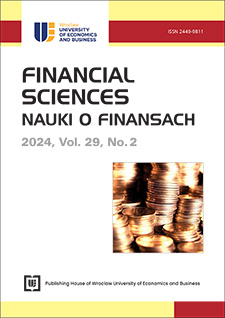True and Fair View of Key Performance Indicators in Evaluating Companies’ Compliance with the EU Green Taxonomy Regulation
DOI:
https://doi.org/10.15611/fins.2024.2.05Keywords:
EU Green Taxonomy, accounting, sustainability reporting, true and fait view, key performance indicators (KPI)Abstract
Aim: Identify the problems and challenges faced by accounting in the process of legitimising organizations with financial mandatory key performance indicators that are designed to measure the share of the company’s environmentally sustainable activities.
Methodology: Literature review, regulatory analysis, desk research.
Findings: The study identified the problems and challenges in the reporting of KPIs for three elements, namely revenue, CapEx, OpEx of environmentally sustainable activities. These problems arose from an analysis of the basic qualitative characteristics of information: its representational faithfulness, completeness, neutrality and accuracy.
Implications: Provide a discussion base point for business practice in the area of sustainability reporting to mandatory financial KPIs, meeting the aims and objectives of the regulation.
Originality/value: The article contributes and fills the existing gap in the literature on the true and fair view of environmentally sustainable economic activity in line with green taxonomy. The results may provide inspiration for future research.
Downloads
References
Alexander, D., & Jermakowicz, E. (2006). A True and Fair View of the Principles/Rules Debate. Abacus, 42(2), 132–164. https://doi.org/10.1111/j.1467-6281.2006.00195.x
Artienwicz, N. (2023). Towards Truer and Fairer. The Judgment and Decision-making Research Journey through Accounting Paradigms. Zeszyty Teoretyczne Rachunkowości, 47(4), 17–32. https://doi.org/10.5604/01.3001.0054.0881
Chiu, I. H.-Y. (2018). An Institutional Theory of Corporate Regulation. Current Legal Problems, 71(1), 279–334. https://doi.org/10.1093/clp/cuy006
Cho, C. H., Roberts, R. W., & Patten, D. M. (2010). The Language of US Corporate Environmental Disclosure. Accounting, Organizations and Society, 35(4), 431–443. https://doi.org/10.1016/j.aos.2009.10.002
Commission Delegated Regulation (EU) 2021/2178 of 6 July 2021 Supplementing Regulation (EU) 2020/852 of the European Parliament and of the Council by Specifying the Content and Presentation of Information to Be Disclosed by Undertakings Subject to Articles 19a or 29a of Directive 2013/34/EU Concerning Environmentally Sustainable Economic Activities, and Specifying the Methodology to Comply with That Disclosure Obligation (2021). https://eur-lex.europa.eu/eli/reg_del/2021/2178/oj/eng
Commission Delegated Regulation (EU) 2023/2485 of 27 June 2023 Amending Delegated Regulation (EU) 2021/2139 Establishing Additional Technical Screening Criteria for Determining the Conditions under Which Certain Economic Activities Qualify as Contributing Substantially to Climate Change Mitigation or Climate Change Adaptation and for Determining Whether Those Activities Cause No Significant Harm to Any of the Other Environmental Objectives (2023).
Commission Delegated Regulation (EU) 2023/2486 of 27 June 2023 Supplementing Regulation (EU) 2020/852 of the European Parliament and of the Council by Establishing the Technical Screening Criteria for Determining the Conditions under Which an Economic Activity Qualifies as Contributing Substantially to the Sustainable Use and Protection of Water and Marine Resources, to the Transition to a Circular Economy, to Pollution Prevention and Control, or to the Protection and Restoration of Biodiversity and Ecosystems and for Determining Whether That Economic Activity Causes No Significant Harm to Any of the Other Environmental Objectives and Amending Commission Delegated Regulation (EU) 2021/2178 as Regards Specific Public Disclosures for Those Economic Activities (2023).
Díez-Martín, F., Blanco-González, A., & Prado-Román, C. (2021). The Intellectual Structure of Organizational Legitimacy Directive 2014/95/EU of the European Parlament and of the Council of 22 October 2014 Amending Directive 2013/34/EU as Journal of the European Union (2014). Regards Disclosure of Non-Financial and Diversity Information by Certain Large Undertakings and Groups, L 330/1 Official Research: A Co-citation Analysis in Business Journals. Review of Managerial Science, 15(4), 1007–1043. https://doi.org/10.1007/s11846-020-00380-6
Directive (EU) 2022/2464 of the European Parliament and of the Council of 14 December 2022 amending regulation (EU) no 537/2014, Directive 2004/109/EC, Directive 2006/43/EC and Directive 2013/34/EU, as regards corporate sustainability reporting (2022).
Hummel, K., & Bauernhofer, K. (2024). Consequences of Sustainability Reporting Mandates: Evidence from the EU Taxonomy Regulation. Accounting Forum, 48(3), 374–400. https://doi.org/10.1080/01559982.2024.2301854
IFRS Foundation. (2018). The Conceptual Framework for Financial Reporting.
Kamiński, R. (2022). Zrównoważony rozwój przedsiębiorstw jako przedmiot raportowania niefinansowego: Regulacje prawne i doświadczenia praktyczne w Unii Europejskiej i Polsce. Polskie Wydawnictwo Ekonomiczne.
Koch, C., Buser, M., & Andersson, R. (2023). The Impact of the EU Taxonomy of Sustainable Finance on the Building Field. W G. Lindahl & S. C. Gottlieb (Ed.), SDGs in Construction Economics and Organization (pp. 283–296). Springer International Publishing. https://doi.org/10.1007/978-3-031-25498-7_20
Krasodomska, J., Zarzycka, E., & Zieniuk, P. (2024). Voluntary Sustainability Reporting Assurance in the European Union before the Advent of the Corporate Sustainability Reporting Directive: The country and Firm-level Impact of Sustainable Development Goals. Sustainable Development, 32(3), 1652–1664. https://doi.org/10.1002/sd.2744 Lucarelli, C., Mazzoli, C., Rancan, M., & Severini, S. (2020). Classification of Sustainable Activities: EU Taxonomy and Scientific
Literature. Sustainability, 12(16), Article 16. https://doi.org/10.3390/su12166460
Luft-Mobus, J. (2005). Mandatory environmental disclosures in a legitimacy theory context. Accounting, Auditing & Accountability Journal, 18(4), 492–517. https://doi.org/10.1108/09513570510609333
Łada, M. (2021). Rachunkowość jako produkt i narzędzie legitymizacji. Oficyna Wydawnicza SGH.
Mućko, P., Niemiec, A., & Skoczylas, W. (2021). Dobrowolny przymus? Uwarunkowania raportowania w zakresie zrównoważonego rozwoju przez małe i średnie przedsiębiorstwa. Zeszyty Teoretyczne Rachunkowości, 45(4), 91–109.
Nowak, W. A. (2014). Rachunkowość sektora finansów publicznych jako rachunkowość branżowa. Prace Naukowe Uniwersytetu Ekonomicznego we Wrocławiu, 373. https://doi.org/10.15611/pn.2014.373.14
O’Reilly, S., Gorman, L., Mac An Bhaird, C., & Brennan, N. M. (2023). Implementing the European Union Green Taxonomy: Implications for Smalland Medium-sized Enterprises. Accounting Forum, 48(3), 401–426. https://doi.org/10.1080/01559982.2023.2272394
Pelikánová, R. M., & Rubáček, F. (2022). Taxonomy for Transparency in Non-Financial Statements – Clear Duty With Unclear Sanction. DANUBE, 13(3), 173–195.
Regulation (EU) 2019/2088 of the European Parliament and of the Council of 27 November 2019 on sustainability‐related disclosures in the financial services sector (Text with EEA relevance), Pub. L. No. 32019R2088, 317 OJ L (2019). https://eur-lex.europa.eu/eli/reg/2019/2088/oj/eng
Regulation (EU) 2020/852 of the European Parliament and of the Council of 18 June 2020 on the establishment of a framework to facilitate sustainable investment, and amending Regulation (EU) 2019/2088 (2020).
Regulation (EU) 2023/2631 of the European Parliament and of the Council of 22 November 2023 on European Green Bonds and Optional Disclosures for Bonds Marketed as Environmentally Sustainable and for Sustainability-Linked Bonds, Official Journal of the European Union L2023/2631, 30.11.2023 (2023).
Schmidt, V. A. (2020). Europe’s Crisis of Legitimacy: Governing by Rules and Ruling by Numbers in the Eurozone (1st edition). Oxford University Press. https://doi.org/10.1093/oso/9780198797050.001.0001
Schütze, F., & Stede, J. (2024). The EU Sustainable Finance Taxonomy and its Contribution to Climate Neutrality. Journal of Sustainable Finance & Investment, 14(1), 128–160. https://doi.org/10.1080/20430795.2021.2006129
Suchman, M. C. (1995). Managing Legitimacy: Strategic and Institutional Approaches. The Academy of Management Review, 20(3), 571–610. https://doi.org/10.2307/258788
Wagenhofer, A. (2024). Sustainability Reporting: A Financial Reporting Perspective. Accounting in Europe, 21(1), 1–13. https://doi.org/10.1080/17449480.2023.2218398
Zetzsche, D. A., & Anker-Sørensen, L. (2022). Regulating Sustainable Finance in the Dark. European Business Organization Law Review, 23(1), 47–85. https://doi.org/10.1007/s40804-021-00237-9
Downloads
Published
License
Copyright (c) 2025 Wanda Skoczylas, Przemysław Mućko, Gabriela Kintop

This work is licensed under a Creative Commons Attribution-ShareAlike 4.0 International License.
Accepted 2024-12-06
Published 2025-01-28









